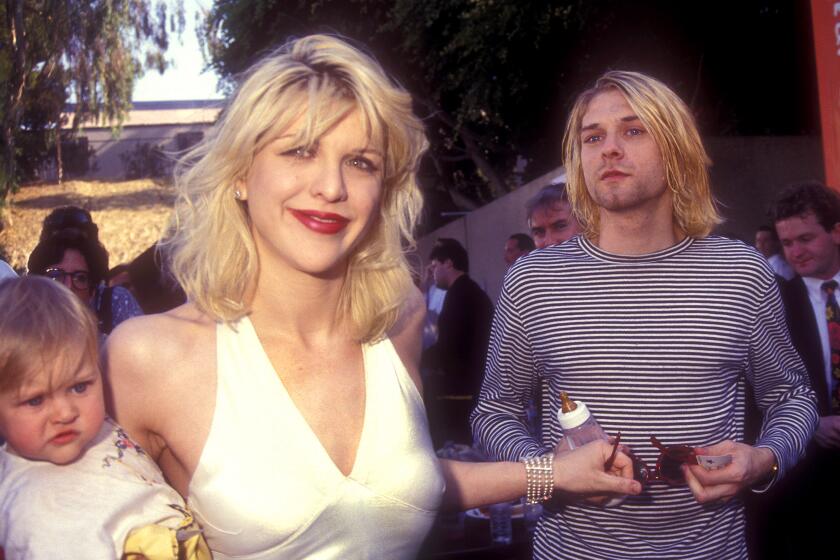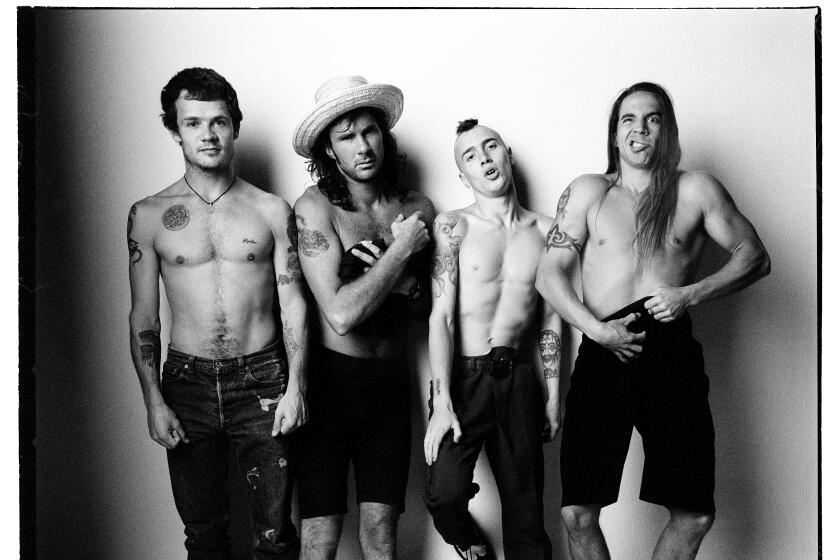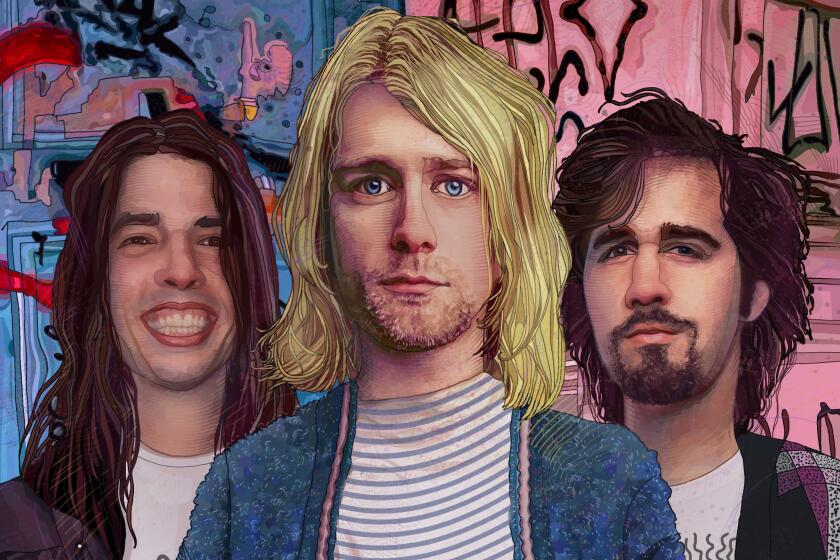Lucy Dacus on the power of ’shrooms, the lessons of ‘Jungleland’ and the problem with rom-coms
- Share via
Lucy Dacus once put her mortal soul at risk for the sake of a Snow Patrol song.
Now an acclaimed 26-year-old singer and songwriter with one of the year’s most insightful albums in “Home Video,” Dacus at the time was a teenager who’d come up square against an authority figure at Baptist church camp.
“The pastor was making everyone delete all the secular music off their iPods, and I literally got into a fight with him over ‘Chasing Cars,’” she recalls, referring to the limpid mid-2000s power ballad famous for its appearance in “Grey’s Anatomy.” “I said, ‘This song, you can imagine it’s about God.’ And he was like, ‘But if the musicians aren’t believers, you’re still supporting people that don’t believe in God.’” She laughs. “I told him I didn’t agree and that I wouldn’t do it.”
Courtney Love talks with Kurt Cobain biographer Charles R. Cross about the still-resonant depths of her late husband’s breakthrough 1991 album, ‘Nevermind.’
Dacus’ Martin Luther moment was just one of the many vivid adolescent experiences she combed through (as set down in her old journals) to find inspiration for the sharply rendered songs on “Home Video,” her third LP. Elsewhere the Richmond, Va., native revisits a heated encounter in “the basement of your parents’ place” and examines time she spent as a teenager with an older man; “Thumbs” channels her anger with a friend’s abusive father, while “Triple Dog Dare” ponders a complicated friendship that helped her understand her sexuality.
Ahead of a concert Friday night at the Theatre at Ace Hotel, Dacus — who also plays in the indie supergroup Boygenius with fellow songwriters Phoebe Bridgers and Julien Baker — spoke with The Times about “Home Video,” her current thoughts on religion and her recent experimentation with psychedelics.

So many of the pop stars that young people listen to right now are young themselves — Billie Eilish and Olivia Rodrigo, for example. I don’t remember it being that way when I was a kid. How about you?
No, pop stars seemed so much older. I grew up listening to Bruce Springsteen and Prince, and I remember listening to the Beatles and Led Zeppelin and not knowing when they were from. I had the sense that music got made long ago.
You weren’t up on the current Top 40?
I was up on Fergie. I loved “Fergalicious” and “Big Girls Don’t Cry.” But even then, it wasn’t about me. I didn’t have anyone in my life who was [personally] making music, so I never thought that people can actually do that.
How does a 26-year-old writing about her teenage experiences differ from an actual teenager writing about them?
I thought for sure that what you think in the moment must be the most true because you’re the closest to the moment at hand. But I’ve come to really distrust my journals. With perspective I can be like, Oh, that’s what was going on. The big impulse of looking back at the teenage years was to actually put them in the past; you get to notice all the distance, and that’s very comforting to me. I don’t want to be a teen again. I look at some of these younger artists, and it’s not that I worry for them, but I just wonder if they had to grow up too fast.
Did you ever find yourself feeling sorry for your younger self?
I don’t know about sorry. But sometimes I’d be reading and it was like a scary movie — this new character would come into the story and I’d know they were a villain, but she wouldn’t yet.

The project shares something with Taylor Swift’s rerecording her old albums.
I think it’s about time I listen to some Taylor Swift. I have an ex that told me, “I love you, but I am actively trying to marry Taylor Swift, and I will leave you.” He was obsessed — had a huge poster of her from her Rolling Stone cover — and I was just like, I don’t really need to interact with this.
You have a line in “Triple Dog Dare” where you say, “If you’re too afraid, it won’t be you I blame.” You’re talking to a female friend for whom you’re developing romantic feelings; her mother disapproves of your relationship. Were you really not mad at your friend at the time, or is that the older you talking?
At the time I was like, “I know you want to hang out — just disobey your mom.” So I was blaming her for not putting a little more gas in the tank. But I think even then I knew it was about her mom. It’s hard to see how narrow your window of freedom is as a kid. You want to believe you have autonomy, but how’s she going to get over to my house? She literally can’t drive.
As ‘Blood Sugar Sex Magik’ turns 30, here’s the inside story of the making of the classic album, as told by the band, producer Rick Rubin and more.
A good number of the songs on the album are addressed to friends rather than lovers, though the latter is kind of the default in singer-songwriter music.
I think about my friendships way more than my romantic life. At least in my life, friendships have variety in a way that romance doesn’t — a depth that’s murkier than romance. You’re taught all of these clear-cut actions and titles and steps within romance — we’re talking, we’re dating, we’re living together — whereas we don’t talk about observable stages of friendship.
You live in Philadelphia now in a house with a half-dozen roommates. Do you like having that many people around?
I love it. I really don’t aspire to live another way. When I’m alone for too long I can just stare into space and dissociate. And we all satisfy different parts of each other. It’s nice to not put all your needs in the hands of one person — like, “OK, you’re my everything.”
Have you done that?
I’ve been asked for that — expected to be the everything — and it’s just unfair. I would love for someone to make a movie or TV show that is the next five years after the final scene of a rom-com. It makes sense that people want the little slice that’s so exciting. But I wish there were more representations of what life is actually like.
Rom-coms never explore what happens after the couple commit to each other.
There’s 20 seconds of it in “The Graduate.” I love that movie for the last 20 seconds.

How did you discover that you like putting words together on a page?
I don’t remember a time when I didn’t, and I think the real credit is that nobody discouraged me. My first three words were “Bible,” “bubble” and “book.” I’ve just always loved stories.
In July you wrote a very moving essay for Oprah’s website about coming out as queer. Are you interested in writing more prose?
I’m definitely interested; I’m just a f— coward and don’t know if I’m good enough yet. Writing songs is so easy; I’m never thinking about whether it’s good or bad. With writing prose, I have all my favorite authors reading over my shoulder, you know? I talked a bit with Michelle Zauner [a.k.a. Japanese Breakfast] while she was writing her book [“Crying in H Mart”] and she gave me this piece of advice that I have yet to be able to take. She said, “Just admit that you’re not gonna write your favorite book. You’re gonna write a book.”
With someone like Springsteen, did you recognize his literary flair even as a kid?
I was maybe 12. There was a moment, and it’s the lyric at the end of “Jungleland,” where he says, “And the poets down here don’t write nothing at all / They just stand back and let it all be.” It occurred to me for the first time that writers have a responsibility. Some people would fight me on that, but I believe it.
Legend has it that Nirvana’s ‘Nevermind’ and the grunge boom ended hair-metal careers and dominated popular music. An in-depth look back tells another story.
You talked in a recent episode of the “Switched on Pop” podcast about avoiding certain sonic textures — guitar sounds or keyboard tones — that evoke specific eras. Why was that important?
Sometimes I think if you’re too evocative of a style, people don’t deep-listen. They’re like, “This is ’80s revival,” then they check out because they’ve felt this before. Plus, I didn’t grow up in the ’80s; I didn’t grow up in the ’70s. If it’s a record about my upbringing, I’m not going to just pick some flavor from the past to show that it happened in the past.
Did you consider using sounds from the ’90s or 2000s?
Maybe it’s something about me that I didn’t think of that. I did grow up in those times, but my upbringing was so church-centric, I feel like I wasn’t so culturally attuned. I was being taught about the impermanence of the world and how the material world is not important. I never made some of these fun and iconic mistakes that everyone did when they were 13 — never dyed my hair, never wore makeup. So maybe that principle carries over to the music: I didn’t rely on those things then, so I wasn’t going to rely on them now.
How would you describe your relationship with religion today?
I don’t go to church. I think about God, whatever that is; I think about all the same questions that people are asking in church. One of the things about church is that it gives you answers. When I was 10 I thought I was going to get raptured into heaven.
Like, imminently?
Before middle school. They taught us how to open lockers in 5th grade, and I was like, “I’m not gonna need this — there are no lockers in heaven.”
What do you do for fun besides music?
I’m a big chiller — I really like just talking with friends. I got into kayaking during COVID. I knit.
Are you into drinking or drugs? It sounds like you definitely weren’t in high school.
I really wasn’t. I hadn’t been drunk until two months after I turned 21. I think historically I’m kind of a lame-ass lady. But I’ll say this: In the past three months I’ve done mushrooms three times. And it was so awesome.
What’d you like about it?
It’s so funny to have done mushrooms a couple of times and now I’m that guy talking about mushrooms. But I do feel fundamentally changed in some ways. One example is, while on mushrooms, I didn’t perceive gender for anyone, including myself. And I’ve carried that into non-mushroom life. When I meet people, it’s like gender is such a thin aspect of who they are.
Do you think your mom and dad would be able to understand that?
I’ve put in a little bit of an effort to begin those conversations. Both of them know trans people at this point. And I definitely don’t feel like I care very much … maybe that’s the wrong wording. I’m not holding tight to the idea of being a woman, basically. I’ve talked to them about how gender is socialized and that whatever freaks them out about it — the language changes or whatever — I’m just like, “You can learn now, like everything else you’ve ever learned.” I feel like I’m up for affording them some patience. My mom visited me in Philly recently, and the first thing she asked was, “What are everyone’s pronouns in the house?”
More to Read
The biggest entertainment stories
Get our big stories about Hollywood, film, television, music, arts, culture and more right in your inbox as soon as they publish.
You may occasionally receive promotional content from the Los Angeles Times.














